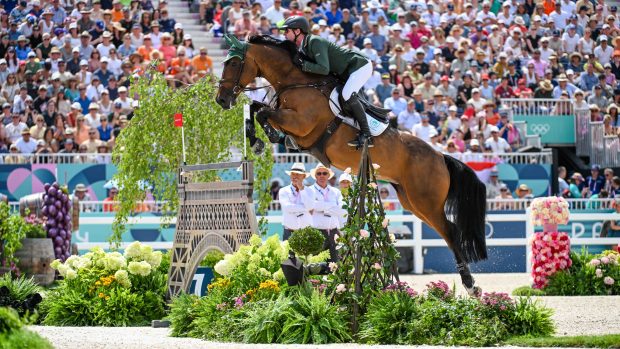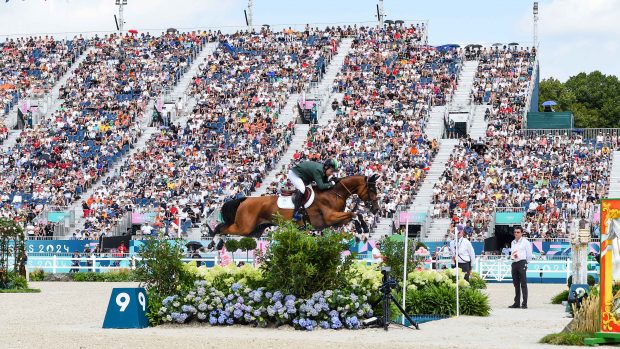The International Equestrian Federation (FEI) has disqualified Cian OConnor from the Olympics after his horse Waterford Crystal tested positive for two banned drugs.
Although the Judicial Committee concluded that OConnor was not involved in a deliberate attempt to affect the performance of the horse, he will also have to serve a three-month suspension.
OConnor and Waterford Crystal won the gold medal in Athens, but traces of banned substances were found in the horses urine sample after the competition. The Irish rider said that Waterford Crystal had been give some sedatives a month before the Olympics during a treatment for a fetlock injury, and requested a counter-test.
The case then took a sinister turn after the urine sample for the counter-test vanished while in transit from the Medication Control Programme Central Laboratory in Paris to the Horseracing Forensic Laboratory in Cambridgeshire last October. Later, a counter test carried out on Waterford Crystals blood sample proved positive to fluphenazine and zuclopenthixol, two drugs which are normally prescribed to humans as anti-depressants.
During Mondays 11-hour hearing, the FEIs Judicial Committee accepted the reports of both doping tests on the grounds that the FEI Veterinary Regulations Art. 1022 permits the combination of analyses of blood and of urine. They also confirmed that both fluphenazine and zuclopenthixol are banned under the federations rules.
As a result, the committee disqualified the Irish combination from the Athens Olympics. Although the FEI ruled that he didnt deliberately set out to enhance Waterford Crystals performance, OConnor was also fined CHF 5,000 (£2,224) and suspended for three months.
The [Judicial Committee] made the decision in two phases. First, they decided if he should be disqualified, secondly they looked at the sanction, explains FEI spokeswoman Muriel Faienza. We have not yet received the complete decision, so we do not yet know why they decided on that sanction. The suspension will start 30 days after the Equestrian Federation of Ireland receives the full statement detailing the FEIs decision.
Despite receiving an unfavourable verdict, OConnor is relieved to be cleared of any deliberate wrongdoing. I am delighted that the Judicial Committee has accepted and affirmed that I was not involved in any deliberate attempt to affect the performance of my horse Waterford Crystal — as I have always maintained, he says in a statement.
While I am disappointed that a technical infraction has resulted in the loss of the gold medal for Ireland, I wish to re-emphasise again today that neither I or my vet James Sheeran have done anything wrong. To get to the Olympics was my aim for many years and I never even contemplated doing anything which might jeopardise this goal.
OConnor hasnt yet decided whether he will appeal to the Court of Arbitration for Sport against the FEI decision, according to his spokesman Wally Young. He has 30 days to appeal from the date he receives the written statement from the FEI. If he doesnt appeal, or if the CAS upholds the FEI verdict, OConnor will lose his gold medal to Brazilian runner-up Rodrigo Pessoa, who finished second on Baloubet du Rouet.
The FEI will officially ask the ICO to change the results [of the Olympics] after the appeal period has ended, says Faienza. If [OConnor] has lodged an appeal, the FEI will wait until the CAS pronouncement.
The Equestrian Federation of Ireland, which risks being deprived of its only Olympic gold medal, declined to comment on the FEIs decision, on the grounds that OConnor has a right to appeal against it and any statement from the EFI might be construed as prejudicing the outcome of an appeal process.
Meanwhile, the doping case against another Irish rider, Jessica Kurten, has been closed after the counter test had a negative result.
Kurtens mare, Castle Forbes Libertina, initially tested positive for caffeine and theophylline at the CSIO in Calgary in September 2004. Kurten vigorously asserted that she had done nothing wrong and refused a proposal from the FEI to accept a fast-track administrative penalty.
In a strongly-worded statement, she highlighted that theophylline and caffeine are often found in animal feeds and that she had been forced by US and Canadian regulations to use feed supplied at the Show. She therefore declined to take advantage of the fast-track option because she felt she couldnt be held responsible for the contents of the feed supplied at the Calgary show. I want the FEI to explain why they chose to sanction me in these circumstances, she said.
A well meant fine is personally insulting and, as I have done nothing wrong, I see no reason for accepting any sanction. If the FEI choose to pursue this, I will fight for the truth. I owe this to myself, my horses, my sponsors, my family and my supporters.
Her views were vindicated when the counter-test she requested came back negative. The case was closed last week.



